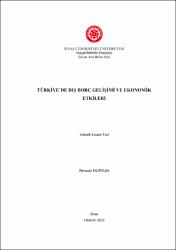| dc.contributor.advisor | Adıgüzel, Uğur | |
| dc.contributor.author | Dursun, Benazir | |
| dc.date.accessioned | 2020-05-15T08:11:13Z | |
| dc.date.available | 2020-05-15T08:11:13Z | |
| dc.date.issued | 2019 | tr |
| dc.date.submitted | 2019-05-24 | |
| dc.identifier.other | X, 99 sayfa | |
| dc.identifier.uri | https://hdl.handle.net/20.500.12418/12382 | |
| dc.description.abstract | Dış borç, Türkiye gibi yükselen piyasalar ve azgelişmiş ülkeler için en önemli
sorunlardan birisidir. Borçların artması hem borç yükünü ,hem de dış borç anapara
ve faiz ödemelerini arttırmıştır. Bu da borç ile finanse edilen yeni yatırımların üretim
hacminde yol açtığı artışların giderek düşmesine ve bir noktada üretimdeki artışların,
dış borçların ödenmesi için gereken sermaye ve faizlerin altına düşmesine sebep
olmuştur.
Özellikle gelişmemiş veya gelişen ekonomiler finansman seviyesini geçerek
yüksek büyüme hızlarına erişmek için dış borçlanmaya sık sık başvurmaktadır.
Alınan dış borcun faal bir biçimde kullanılmaması ve dış borcun anapara, faiz
ödemelerinin milli gelir artışından daha fazla artması durumunda alınan dış borçları
ödeyebilmek için yeniden borç alınmasını gerektirmektedir. Böylece dış borç yükü
artmakta ve ülkenin refah seviyesi azalmaktadır. Türkiye’de de durum, gelişmekte
olan ülkelerden farksızdır. Özellikle 1980’den sonra, gerçekleştirilen iktisadi ve
finansal reformların etkisinden, bu dönemde uygulanan politikalardan kamu dış borç
düzeyi hızla artmıştır.
Çalışmanın birinci bölümünde, dış borcun kavramsal ve teorik çerçevesi ele
alınarak, dış borçlarla ilgili temel kavramlar, dış borçlara ilişkin görüşler ve
modeller, dış borç türleri ve dış borç sorunun çözümüne ilişkin yaklaşımlar
konularına detaylı olarak yer verilmiştir.
İkinci bölümde, dış borç ihtiyacının nedenlerini belirleme yöntemleri ve
ekonomik etkileri kapsamlı bir şekilde değerlendirilmiştir.
Üçüncü bölümde ise, Türkiye ekonomisinde dış borç sorunu ve dış borcun
ekonomik etkileri ve büyüme üzerine etkisi ele alınmış ve tarihsel olarak
incelenmiştir.
Çalışmanın dördüncü bölümünde, dış borçlanma ve ekonomik büyüme ilişkisi
üzerine bir ampirik uygulama yapılarak, metodoloji oluşturulmuştur ve uygulamada
yıllık veriler kullanılmıştır. Genişletilmiş (Augmented) Dickey-Fuller (1981,ADF)
Birim Kök Testi uygulaması yapılmış ve Bai-Perron (2003) Yapısal Kırılmaları
dikkate alan eşbütünleşme testine de çalışmanın bu bölümünde yer verilmiştir.
Türkiye ekonomisinde dış borcun en önemli belirleyicisinin gayrisafi yurtiçi hasıla
olduğu saptanmıştır. Ayrıca tasarruf oranı yetersizliği, ödemeler bilançosu açıkları,
kamu bütçe dengesinde oluşan açıklar ve ekonomik büyümenin yarattığı zenginleşme
olduğu görülmüştür. | tr |
| dc.description.abstract | External debt is one of the most important issues for emerging markets and
underdeveloped countries, such as Turkey. The increase in debts has increased both
the debt burden and the external debt principal and interest payments. This has led to
a gradual decrease in the production volume caused by new investments financed by
debt, and at some point the increase in production has fallen below the capital and
interest required for the repayment of external debts.
Particularly underdeveloped or developing economies frequently apply to
external borrowing in order to reach high growth rates by exceeding the financing
level.
In the event that the external debt received is not actively used and the principal of
the external debt increases with interest payments higher than the increase in national
income, it requires re-borrowing in order to repay the external debt received. Thus,
the external debt burden increases and the welfare level of the country decreases. In
Turkey, the situation is no different from developing countries. Especially after 1980,
due to the effects of economic and financial reforms, the level of public foreign debt
increased rapidly from the policies implemented in this period.
Borrowing have seen as one of the important financing sources of the state
and the negative effects such as borrowing have positive effects on the growth are
attracting attention. Besides the growth of the economy, there is an increasing level
of external debt. In particular, undeveloped or developing economies are often
resorted to external borrowing in order to reach high growth rates by more financing
dimension. In case the external debt is not used effectively and the external
borrower's principal increases the interest payments more than the increase in the
national income, it needs to be borrowed again in order to pay the debts. Debt burden
is increasing and the welfare level of the country is decreasing. In Turkey, the
situation is no different from developing countries. Especially after 1980, performed
economic and financial reforms’ effect and public extrenal debt levels increase
because of appling policy at period.
In the first chapter of the study, the conceptual and theoretical framework of
external debt is discussed and the basic concepts related to external debt, opinions
and models of external debt, types of external debt and approaches to the solution of
external debt are discussed in detail.
In the second part, the methods of determining the causes of the external debt
need and their economic effects have been evaluated extensively.
In the third part, the external debt problem in Turkey's economy and its
impact on the foreign debt were discussed and examined historical economic impact
and growth.
In the fourth part of the study, an empirical application is made on the
relationship between external borrowing and economic growth, methodology is
created and annual data are used in the application. Augmented Dickey-Fuller (1981,
ADF) Unit Root Test was applied and Bai-Perron (2003) cointegration test
considering structural breaks is included in this part of the study. Gross domestic
economy the most important determinant of the foreign debt of Turkey was
determined to be a product. In addition, it was observed that there were insufficiency
of saving rate, balance of payments deficits, deficits in public budget balance and
enrichment caused by economic growth. | tr |
| dc.language.iso | tur | tr |
| dc.publisher | Sivas Cumhuriyet Üniversitesi Sosyal Bilimler Enstitüsü | tr |
| dc.rights | info:eu-repo/semantics/openAccess | tr |
| dc.subject | Dış Borç | tr |
| dc.subject | Ekonomik Etkiler | tr |
| dc.subject | Türkiye Ekonomisi | tr |
| dc.title | Türkiye’de Dış Borç Gelişimi Ve Ekonomik Etkileri | tr |
| dc.type | masterThesis | tr |
| dc.contributor.department | Sosyal Bilimler Enstitüsü | tr |
| dc.relation.publicationcategory | Tez | tr |















